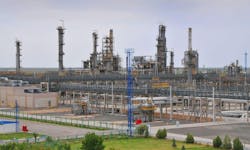Uzbekneftegaz lets contract for Bukhara refinery modernization program
JSC Uzbekneftegaz has let a contract to SK Engineering & Construction Co. Ltd. (SK E&C) to deliver front-end engineering design (FEED) services for a proposed $600-million modernization and reconstruction project at subsidiary Bukhara Oil Refinery LLC’s (BOR) 50,000-b/d condensate refinery at Karaoul Bazar, located 55 km from Bukhara, in southwestern Uzbekistan, 437 km southwest of Tashkent.
As part of the $7.2-million FEED contract, SK E&C will provide basic engineering studies reviewing design, applicable processing technologies, and cost estimates for execution of the planned modernization, which—alongside aiming to increase existing processing capacities to 95% from 79% and production of light oil products to 91% from 77%—intends to expand the refinery’s capabilities to convert and upgrade heavy oil and fuels into more environmentally friendly Euro 5-quality gasoline and diesel in compliance with the government of Uzbekistan’s stricter specifications for fuel products taking effect in 2023, Uzbekneftegaz, BOR, and SK E&C said in separate releases.
In addition to upgrades at the refinery’s existing atmospheric distillation unit, gas oil hydrotreater, and amine purification units, the modernization project will include the addition of a new naphtha hydrotreating unit, light naphtha isomerization unit, fuel oil catalytic cracking unit, and a short-cycle adsorption unit to help increase hydrogen purity, Uzbekneftegaz and BOR said.
Official signing of the FEED contract on July 7 follows earlier agreements between Uzbekneftegaz and SK E&C to proceed with and accelerate the modernization project signed on Apr. 19, 2019, and Feb. 7, 2020, respectively, Uzbekneftegaz said. The agreements come as part of an April 2019 resolution by Uzbekistan President Shavkat Mirziyoyev to further expand and strengthen ties with South Korea, according to the companies.
Modernization overview
Previously planned at a total investment of $553 million, the Bukhara refinery modernization and reconstruction project—already under way—will be executed in three phases, according to an Aug. 15, 2019, presentation from BOR.
Completed in early 2020, the first stage involved replacement of the catalyst system in the refinery’s existing gas oil hydrotreater to increase production of Euro 4 and Euro 5-quality fuel. While supplier Axens Group was unable to directly participate in the catalyst changeout due to coronavirus (COVID-19) quarantine restrictions, the service provider remotely worked with the refinery to complete the project, enabling the refinery to begin production of both Euro 4 and Euro 5 diesel fuels on Mar. 30, Uzbekneftegaz and BOR said on Apr. 1, 2020.
Scheduled to be completed by yearend 2022, the second-stage modernization work will include upgrading and reconstructing existing processing units at the site to enable 100% production of Euro 5-quality diesel, as well increase output of high-octane gasoline grades AI-91, AI-93, and AI-95.
Slated for completion in 2025, the modernization program’s final stage will involve construction of new units focused on improving the refinery’s overall crude processing to 95% of its nameplate capacity, as well as boosting its production of higher-value, light oil products to 91%, according to BOR.
While Bukhara’s modernization and reconstruction program will not increase the refinery’s current 50,000-b/d crude processing capacity, the project, once completed, will enable the plant to produce 1.2 million tpy of gasoline, 750,000 tpy of diesel, and 200,000 tpy of jet fuel, all of which meet Euro 5-quality standards, according to local Uzbeki media reports.
The modernization program will be the first to take place at the Bukhara refinery, which—commissioned in August 1997—was the first grassroots refinery built in the former Soviet Union following its breakup (OGJ Online, Aug. 10, 1998; Aug. 26, 1996).
About the Author
Robert Brelsford
Downstream Editor
Robert Brelsford joined Oil & Gas Journal in October 2013 as downstream technology editor after 8 years as a crude oil price and news reporter on spot crude transactions at the US Gulf Coast, West Coast, Canadian, and Latin American markets. He holds a BA (2000) in English from Rice University and an MS (2003) in education and social policy from Northwestern University.

